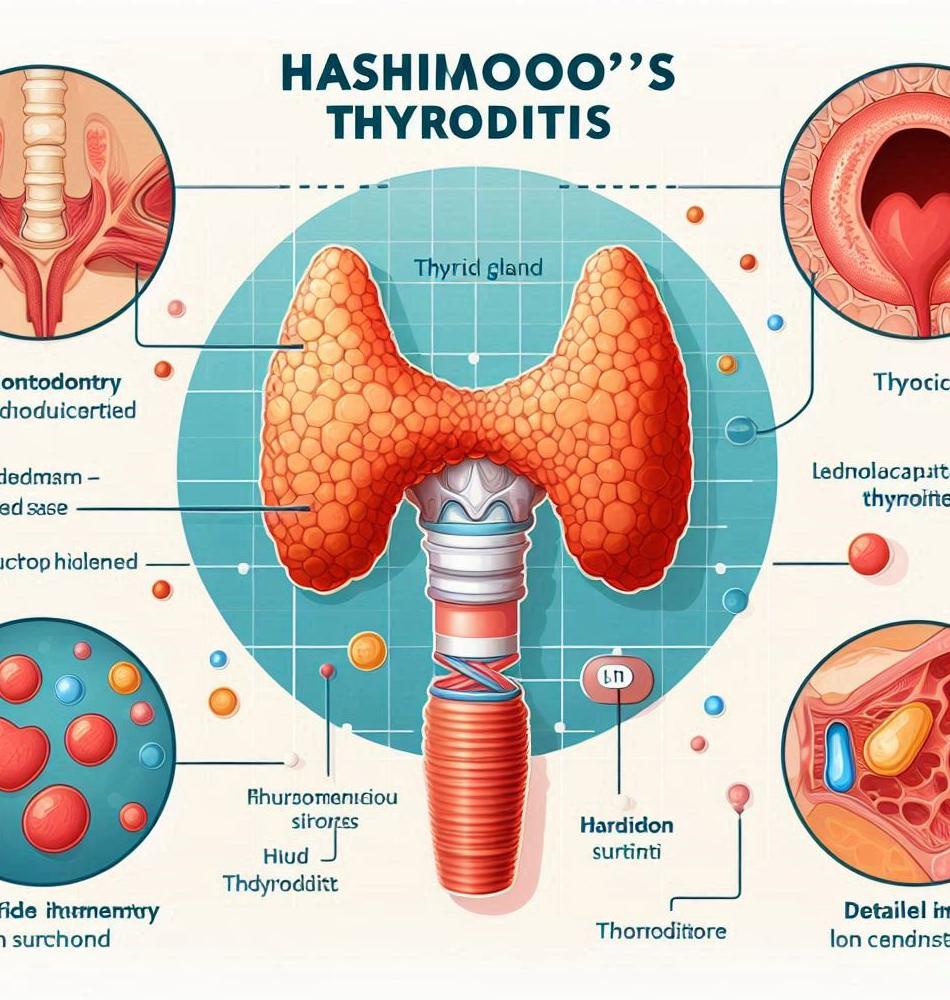Unraveling the Mystery: What Causes Hashimoto's Thyroiditis? 🧩
Hashimoto's thyroiditis, a name that may sound complex but is relatable to many, has roots that intertwine with the intricate world of our immune system and hormones. If you've ever wondered why your thyroid—the small butterfly-shaped gland in your neck—can turn against you, you are not alone. Understanding what causes Hashimoto's is essential in this modern age, where autoimmune diseases are on the rise. In this article, we will dissect the causes and symptoms of Hashimoto's thyroiditis, helping you navigate this challenging yet fascinating topic.
The Basics of Hashimoto's Thyroiditis 💡
First, let’s lay the foundations. Hashimoto's thyroiditis is an autoimmune condition where the body's immune system mistakenly attacks the thyroid gland. This leads to inflammation and impairs the gland's ability to produce hormones effectively. While the exact causes remain somewhat elusive, there are several factors that can contribute to the onset of this condition.
Understanding the Causes of Hashimoto's Thyroiditis 🔍
Genetic Predisposition 🧬
One significant element believed to influence the likelihood of developing Hashimoto's thyroiditis is genetics. Research suggests that individuals with a family history of autoimmune diseases are at a higher risk. If you have a close relative diagnosed with an autoimmune condition, it could potentially indicate that your immune system may be similarly predisposed. Some genetic factors include:
- Family history of thyroid dysfunction- Additional autoimmune diseases like lupus or rheumatoid arthritisEnvironmental Triggers ☢️
While genetics lay the groundwork, environmental factors can often serve as the spark that ignites Hashimoto's. These triggers vary widely but include:
- Viral and bacterial infections - Exposure to certain chemicals or heavy metals- Radiation exposure, particularly in areas where nuclear activities are prevalentThe Role of Stress 😰
Chronic stress has made a name for itself as a significant player in a multitude of health issues, including autoimmune diseases. It's hypothesized that the stress response may alter immune function. Factors contributing to stress management include:
- Lifestyle choices such as diet and physical activity- Mental health status and coping strategiesDietary Components 🍽️
Your diet may also play a crucial role in the development of Hashimoto's. Certain dietary components have been proposed to influence thyroid health negatively. Here are some dietary considerations:
- Excessive iodine intake, which can aggravate thyroid dysfunction - Gluten, particularly in genetically predisposed individuals, may trigger an inflammatory response- Vegetable compounds known as goitrogens found in foods like soy and cruciferous vegetables can disrupt hormone production when consumed in large amountsHormonal Changes 🌒
Hormonal fluctuations, particularly during significant life stages like puberty, pregnancy, or menopause, may also trigger Hashimoto's. Women are disproportionately affected by thyroid disorders, indicating that estrogen's role could be a contributing factor. Observations include:
- Increased prevalence of Hashimoto's in women compared to men- Studies suggesting that hormonal changes can exacerbate autoimmune responsesRecognizing the Symptoms of Hashimoto's Thyroiditis 🚨
Understanding what to look for is vital in managing Hashimoto's effectively. As your immune system attacks the thyroid, a variety of symptoms may arise. Frequent symptoms include the following:
- Fatigue and lethargy - Depression and anxiety - Cold intolerance - Hair loss or thinning - Weight gain not reflective of diet and lifestyleThe Importance of Early Detection 🕵️♀️
Because many symptoms overlap with other health conditions, early detection of Hashimoto's can be challenging. If you suspect thyroid-related issues, consulting with a healthcare professional is critical. They may recommend blood tests to check:
- Thyroid-stimulating hormone levels- Anti-thyroid antibodiesFrequently Asked Questions about Hashimoto's Thyroiditis 🤔
- What are the common treatments for managing Hashimoto's thyroiditis?- Can Hashimoto's thyroiditis lead to other health complications?- Is there a specific diet recommended for people with Hashimoto's?- Are there lifestyle changes that can help mitigate symptoms?- How does Hashimoto's affect fertility and pregnancy?Understanding Treatments and Lifestyle Adjustments 💊
The good news is that with proper diagnosis, management of Hashimoto's thyroiditis is entirely feasible. Treatment typically revolves around hormone replacement therapies, specifically levothyroxine. However, additional strategies can complement your conventional treatment. Such strategies include:
- Consuming an anti-inflammatory diet rich in fruits, vegetables, and healthy fats - Regular physical activity to improve metabolism and mood - Incorporating mindfulness techniques such as meditation or yoga to combat stressConclusion: Taking Charge of Your Thyroid Health 🌈
In conclusion, while the exact causes of Hashimoto's thyroiditis can be intertwined with genetics, environmental factors, and lifestyle choices, being informed about the symptoms and management options is paramount. Armed with knowledge, you can take proactive steps toward maintaining your thyroid health and overall well-being. Remember, everyone’s journey with Hashimoto’s is unique, so listen to your body and work closely with healthcare providers to tailor a treatment plan that suits you.
.png)





